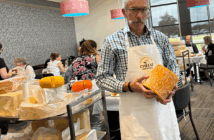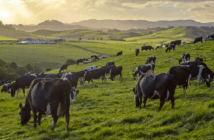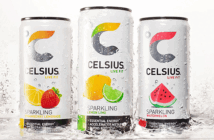
Abbe Hyde
With a master’s in Disruptive Innovation, co-founder of Winely, Abbe Hyde is used to thinking outside the box.
While working with SproutX ag-tech accelerator teams in 2017, she and Jacob Manning decided they wanted to help winemakers track the fermentation process to ensure perfect wine, without being weighed down by the task. So, they set about developing a product that automates data collection and analysis for them, meaning winemakers can concentrate on the other more fun parts of the craft.
HotSource: What was your motivation for studying a master’s in Disruptive Innovation? And what/where did you study before doing that?
Abbe Hyde: I did a business degree at the University of Otago and completed it over in the states at the University of Minnesota. In Minnesota, I was lucky enough to be involved in a world-class entrepreneurial programme which is what got me started on my journey with entrepreneurship and innovation. On returning to New Zealand I was offered an opportunity to undertake a master’s focused on innovation in the transportation space, with a focus on sustainability. I engaged with high tech companies like Lanzatech and learned about regulatory and market barriers associated with their innovations. It was then that I became a little obsessed with innovative technologies and their ability to change the status quo in unexpected ways. Innovation, specifically disruptive innovation, takes a lot of people by surprise, you have to be on the ball and if something sounds crazy then that’s a sign that it may just be the next big thing… of course, it may fail! The uncertainty and ability for major improvements to society are what makes it fascinating, exciting, and of course, challenging.
What would you like to see more of in the food and beverage industry?
I think overall I’ve been pleasantly surprised coming into the food and beverage industry at how open people are to new technologies, especially ones that provide process improvements. I’d like to see more technology companies targeting these industries because I think it is a real opportunity for growth and there are many problems to solve that would create significant value add. In saying that I’d like to see fewer companies targeting the industry as a ‘side thought’ or ‘afterthought’. Food and beverage is a huge industry and there are multiple sectors all with unique challenges. Tech companies coming into this space should take the time to deeply understand customer needs and ensure they are creating a solution that actually fits with practices of the industry. Beer is not the same as wine and wine is certainly not the same as water. I think too often we see companies trying to apply broad solutions from outside the industry which just aren’t feasible in this world.
What do you think needs to happen to encourage more young people to choose a career in food and beverage?
I’m biased of course but here at Winely we’re doubling our team size and I’ve been over the moon at how excited everyone is to have the opportunity to apply their skills to the wine industry, the world’s most ancient example of biotechnology. We’re seeing a lot of young people from diverse backgrounds – microbiology and food science through to mechatronics and data science applying for our roles. We haven’t noticed a lack of enthusiasm – quite the opposite! I think, especially with the impacts of COVID, people are starting to ensure they are working with companies that are solving real problems for real (essential) industries. Wine has been around forever and it’s not going anywhere, anytime soon. Plus it’s delicious.
What’s something you’re particularly looking forward to in the future innovation-wise?
Functional foods. And to get even more specific, functional, fermented foods. Gone are the days where people will pick something up from the supermarket simply to fill themselves up. People are beginning to demand foods that can provide real health benefits. I believe the future innovations in food are limitless – we have the ability now to create new food types that are not just more ethical and efficient to produce (think Impossible Burger and their use of fermentation to create protein structures to emulate meat) but actually have health benefits. We saw an example hit the supermarket shelves this year with Lewis Road collagen-infused milk (note the controversy…that’s actually a sign of disruptive innovation!). I think we will see more and more of this. People will begin demanding more from their food and functional foods have the potential to provide massive health benefits. If we can ferment it, even better, fermentation is an incredibly efficient, smart way to make a product – that’s why we are starting to see if in so many production processes, from wine to concrete and biofuels.




























































































